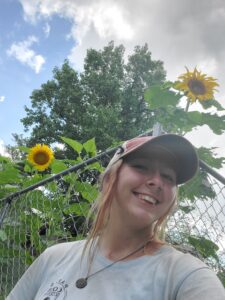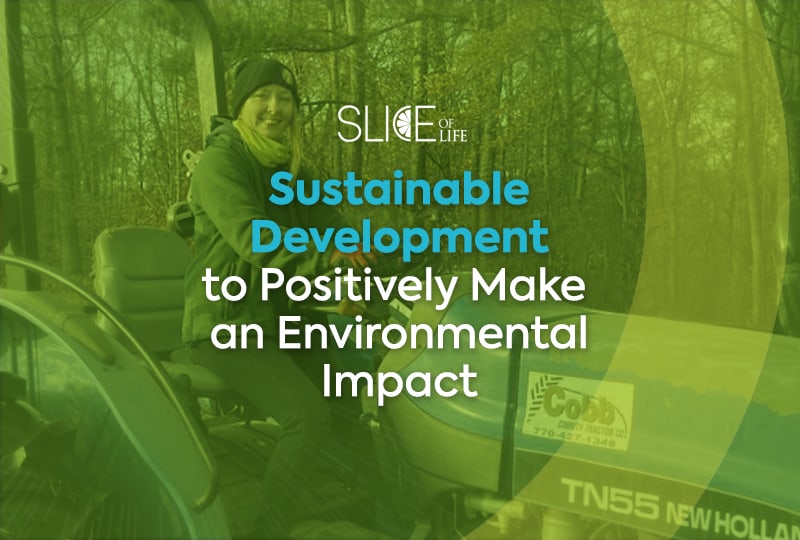Life University (Life U) Research Series
College of Graduate and Undergraduate Studies
Kaitlin Ivey, B.S. in Human Ecology (expected graduation date 2023 Fall Quarter); Advisor Dr. Stephanie Wakefield, Program Coordinator + Assistant Professor | Human Ecology Program, Research Chair
“Sustainable Development to Positively Make an Environmental Impact”
Life University (Life U) Human Ecology student Kaitlin Ivey is completing her research project on permaculture and how this practice is an eco-friendly solution to better help the environment and climate change. Originally, Ivey’s focus was on climate change, but as she began to study the topic further, she was drawn toward the practice of the permaculture lifestyle.
“What I did get from the past research was a lot of the problems are that we are trying so hard to find new ways to do things that we have lost the old way of how to do things. And that is where actual good learning came from. Going back to the roots,” said Ivey. “Combating against climate change is having that respect and love for nature.”
Ivey will be creating a presentation to share with other Life U students this spring. Her goal for this project is to be able to teach others about permaculture as it relates to farming, as well as how our environment can benefit from this type of green living practice.
“Permaculture is a lifestyle; it is about working along with nature rather than against it. And the biggest part I am taking out of it is not just the lifestyle part, but also the gardening and farming. That is the one aspect of how to help with climate change, because agriculture is of the biggest problems in climate change,” shared Ivey.
Monoculture farming is a common modern farming process in agriculture where there is only a single crop planted over the entire field. This practice, according to Ivey, degrades the soil and requires pesticides and fertilizers to be added to the it, putting unnatural chemicals into the very soil that we grow and from which we eventually eat food. These chemicals can be washed off and end up into rivers, “affecting multiple ecosystems.” There is no biodiversity, creating a higher chance for pests and disease. It depletes the soil because the one crop will constantly take only one nutrient from the soil. The result of the soil depletion is the need for genetically modified organisms, where the plants are genetically engineered. From here, this leads to the birth of superbugs that are resistant to pesticides and the cycle of less crops produced overall. These superbugs can destroy an entire monoculture field.
“Permaculture has a lot to do with working with nature rather than against it, so you don’t use chemicals; it’s all organic. You don’t even till the soil, because when you till the soil, it breaks up the mycobacteria in it and also breaks up the carbon that’s on top of the it, which releases back into the environment,” said Ivey.
Ivey shared that the soil holds a lot of carbon, but due to the high ratio of concrete and buildings versus soil in our environment, there is nowhere for the carbon to go except into the atmosphere. This results in a negative environmental footprint being left.
One of Ivey’s goals of this project is to acquire more knowledge for her future career teaching others about food sustainability. The regenerative farming practices and sustainable living habits are better for the environment. Ivey also wants to share with other Life U students this practice to give them the tools to do this on their own. She said that there is a good amount of interest among other students regarding food sustainability, but sometimes it can be overwhelming on how to achieve these goals. She wants to share with students that there are many different types of food sustainability, and this is one type. Another goal is to be able to share her findings with the Life U Nutrition Department and perhaps share how permaculture could be implemented into the Life U garden.
Currently, Ivey is working at Hyde Farm Park in Cobb County. One of the goals of this farm is to provide free produce to residents, and everything that Ivey grows is left for people to take for their homes and families. She has implemented permaculture agriculture at the farm and is researching how the farm has been improved from last year when she was not using this technique there. She will be presenting a report with her findings this spring.
What’s growing on the farm
 “The main difference from last year that I am doing this year is adding plants for pest control. These are plants that will help deter pests from destroying the crops or help invite predator insects that will help control pests,” said Ivey.
“The main difference from last year that I am doing this year is adding plants for pest control. These are plants that will help deter pests from destroying the crops or help invite predator insects that will help control pests,” said Ivey.
2023 Garden Plants
Produce: Squash, Broccoli, Garlic, Beans, Corn, Cucumber, Peppers, Kiwi, Watermelon, Field peas, Beets, Lima beans, Collards, Sorghum, Radish, Sweet potatoes, Okra, Dinosaur Kale
Pest Control: Marigolds, Sunflowers, Lavender, Mint, Basil, Chrysanthemums, Lemongrass, Milkweed, Hawthorn, Wildflower seeds
For more information about the Human Ecology program at Life U, please visit the program page.
Slice of LIFE is an invitation to and extension of everything happening at Life University. Whether you are a current student, a potential freshman or a proud alumni, Slice of LIFE can help keep you connected to your academic community. Know of a compelling Life U story to be shared, such as a riveting project, innovative group or something similar? Let us know by emailing Marketing@life.edu.


Social Media